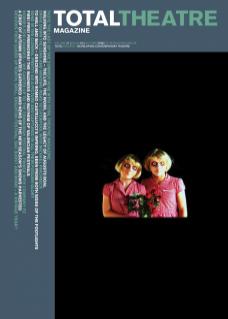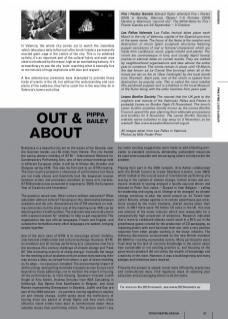Bratislava is a beautiful city set on the banks of the Danube, near the Austrian border, just 40 miles from Vienna. The city hosted the spring plenary meeting of IETM – International Network for Contemporary Performing Arts, one of two annual meetings held in different European cities; it will be in Vilnius this October and Glasgow spring 2010. This was my first visit to an IETM meeting. The host country presents a showcase of performance but these are not trade shows and thankfully lack the desperate tension between artists and promoters prevalent at many arts markets. IETM Bratislava was conceived in response to ‘2009: the European Year of Creativity and Innovation’.
The question raised was: What culture without education? What education without culture? Focusing on this relationship between academia and the arts characterises the IETM emphasis on making connection, but the sheer size of the meeting (over 400) can be daunting when travelling alone. The welcome was extremely warm with a special session for ‘newbies’ to help us get acquainted. The organisation has two official languages, French and English, and outside the formalities many other languages are spoken, bringing people together.
One of the main roles of IETM is to encourage artists’ mobility, international collaboration and cultural exchange. However, IETM, its members and all touring performing arts companies now face the enormous 21st century challenge of climate change and ‘Peak Oil’ (the increasing scarcity of cheap energy). Ironically the image for the meeting was of airplanes with jet stream tails weaving their way across a slide, as viewed from above, a pair of shoes standing on its edge – no visual pun intended. The environmental impact of all the energy used getting hundreds of people across Europe (and beyond) to these gatherings, not to mention the impact of touring all the performances, is mind blowing. Speakers included Judith Knight of Arts Admin, Andrew Ormston from RGA Consulting in Edinburgh, Guy Gipens from Kaaitheater in Belgium, and Juraj Rizman representing Greenpeace in Slovakia. Judith and Guy are part of the 2020 network – six partners coming together to explore art and climate change. Judith spoke about the inefficiency of touring since the advent of cheap flights and how much more effective visual artists have been to communicate about these complex issues than performing artists. The picture wasn’t rosy but some exciting suggestions were made to add offsetting principles to standard contracts, demanding sustainable resources be used where possible and encouraging others to help tackle the problem.
Playing their part in the 2020 network, Arts Admin collaborated with the British Council to create Slowboat (London, June 2009) which looked at the crucial issue of international performing arts touring in the context of climate change. Invited artists and producers involved in touring enjoyed a locally sourced dinner and listened to Peter Tom Jones – Skyped in from Belgium – calling for leadership and urging us to ‘change or be changed’ as climate change continues to alter the world around us. Al Tickell from Julie’s Bicycle, whose agenda is to reduce greenhouse gas emissions caused by the music business, shared stories about their work. In 2007 there were 110 million CD sales in the UK, this was one element of the music industry which was responsible for a comparatively high proportion of emissions. Research indicated that a move to cardboard sleeves could result in a 95% cut in the greenhouse gases created by the production of CD packaging, so replacing plastic with card has been their aim, with a very positive response from other people working in the music industry. The following discussions concentrated on the new British standard BS 8900 for creating sustainable events. Many participants were frustrated by the lack of concrete knowledge in the sector about how sustainable or not existing practice is, and focusing on the government standard did not utilize the wealth of knowledge and creativity in the room. However, it was a bold beginning and many pledges and initiatives were inspired.
Primarily the answer is simple: travel more efficiently, waste less and communicate more. Find ingenious ways of reducing your emissions and encouraging others to do the same.
For more on the 2020 network, see www.2020network.eu

